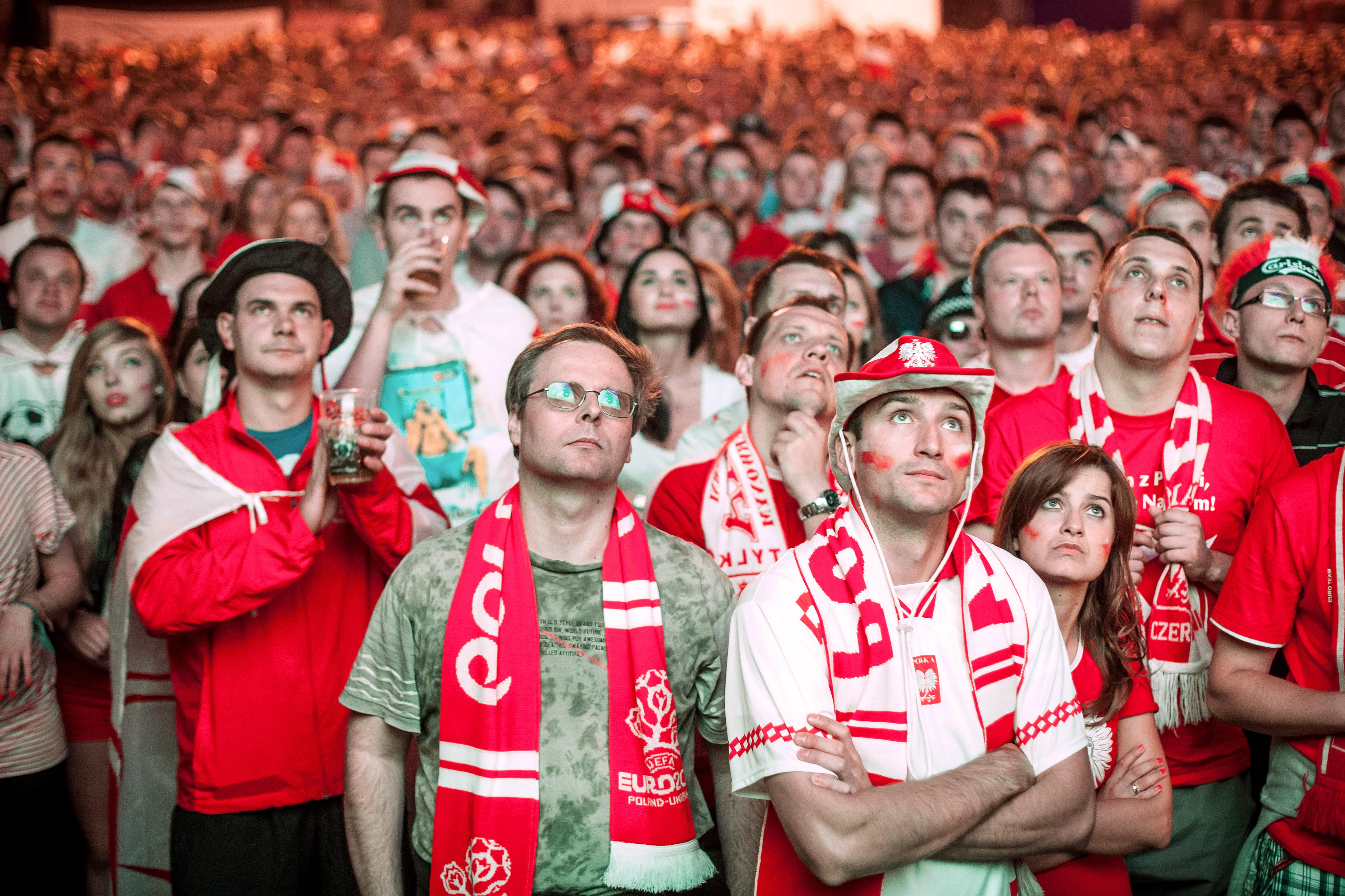WARSAW—At the beauty shop on Grzybowska Street, the manicurist was glancing at her watch. Dressed in a red and white top, wearing red and white feather earrings, she’d been painting people’s fingernails red and white all day long. But now she wanted to finish—soon it would be time for the match. Was she going? Of course she was going. “Everyone I know is going!”
In Warsaw last Friday, it did indeed seem as if everyone was going to the match—the opening match of Euro 2012 that is, which is hosted this year by Poland and Ukraine. Poland was playing Greece in the first game, and more than 50,000 people were heading for the stadium. Several tens of thousands of others were gathering in the “fan zone” in the center of town. Most were dressed in the colors of the Polish flag: red shirts, white trousers, red bikini tops, white ribbons, red socks, white shoes.
The tiny minority sporting blue and white for Greece certainly stood out. But when they met, the Greek fans chanted “Hellas! Hellas!” and Polish fans responded “Polska! Polska!” and both laughed and moved on. This lack of ill will might reflect the lack of historical enmity between Poland and Greece, since Polish and Russian fans did take a few slugs at one another after their match on Tuesday. It might also reflect the fact that neither team has much chance of winning the tournament anyway. I told the manicurist many feared Poland would fail to advance past the first round. She shrugged. “I’m just happy we have the tournament, and I really want to enjoy it.”
I’m just happy we have the tournament and I really want to enjoy it. I thought about those words later that evening, when I myself headed for the stadium dressed in red and white and listened to the crowd’s roars of ecstasy and agony (Poland tied Greece 1-1 and also tied Russia 1-1, to general relief.) Everyone really did have a good time chanting “Polska, Polska,” inside the stadium and out. But was it worth it?
If you just do the math, it’s pretty clear that it wasn’t. Nobody knows yet what the final cost of the Euro tournament will be to Polish and Ukrainian taxpayers, but the stadiums alone represent an enormous investment. Eight arenas had to be built or refurbished, at a cost of approximately $2.8 billion while ticket sales during the tournament will only come to something like $190 million. Even counting spending on food, drink, and hotels that’s still a large budget gap to fill, and it isn’t going to be made up later on. Warsaw’s new National Stadium cost the taxpayers, according to which estimate you believe, about $550 million. It will be used four times during the tournament, and then what? Will it stand empty, like the Bird’s Nest stadium built for the Beijing Olympics? Or will it host tiny crowds, like the money-losing arenas built for the 2002 World Cup in Korea and Japan?
If this year’s soccer hosts lose money, it would hardly be surprising, since most international sporting events do. Look at next month’s London Olympics: In 2002, the U.K. government estimated the costs of hosting the Olympic Games at 2.8 billion. Ten years later the price has passed 15 billion pounds and is still rising. When everything is added up—lost business, 13,500 British soldiers patrolling the streets of London (more than there are in Afghanistan)—the final number may come to 38 billion.
That’s a hefty sum for any government to spend on bread and circuses—though after watching the opening ceremony in Warsaw last week I wonder. The happiness of the Polish manicurist, for example, so pleased that that “we have the tournament” and that Warsaw, just like other European capitals, now has a “real” soccer stadium: What price do you put on that? The cheerful Ukrainian fans, their faces painted blue and yellow, so pleased to play host to a bunch of foreigners who otherwise wouldn’t know they exist: How much is that worth?
In modern Europe, big sporting events are pretty much the only time you’re allowed to scream your country’s name without embarrassment. At an otherwise gloomy historical moment, they’re also pretty much the only time you’re allowed to ignore bad economic news. The Spanish prime minister ended his press conference on the bailout of his nation’s banks abruptly on Sunday, on the grounds that he had to fly to Gdansk to watch his nation’s team—and everybody forgave him. Every budget-cutting bone in my body feels major sporting investments are a waste of money. But if there were a way to put a monetary value on the national mood, perhaps the sums would come out differently.
